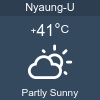Bagan
The magical beads of pyu
- Details
- Hits: 4927
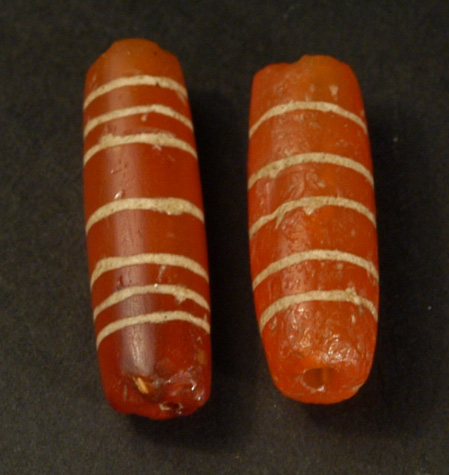 The magical beads of pyu
The magical beads of pyu
photo credit - www.beadcollector.net
The types of beads that Pyu people wore include, patterns like tiger pictured beads, pictures
of elephant and pig while there are patterns like cylinder shaped beads of red, black or green colors.
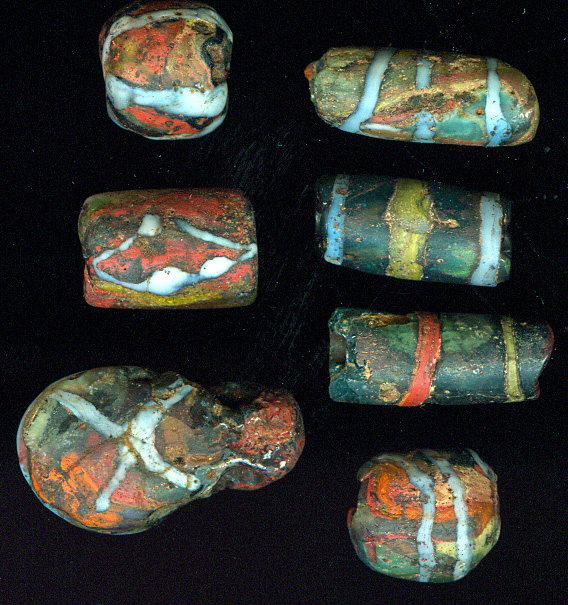
The villager wanted to show a person who has got some beads made by the ancient Pyu people. He said the
beads were found under a rock in the paddy field during the plowing season in Sar Lin Gyi, west of Monywa.
If the beads were real, they should be about 2000 years of age and have to be drifted away from some of the
cities that Pyu people had been populated during the Pyu eara _ the old city called Mine Maw city, Beithanoe,
Han Linn and Thayay Kittayar cities near Pyay that were in the middle of Myanmar. It was a surprise to
know that those beads also known as Pyu beads was found somewhere those ancient city people have not
lived. Those doubts were even more confirmed when the bead was seen personally.
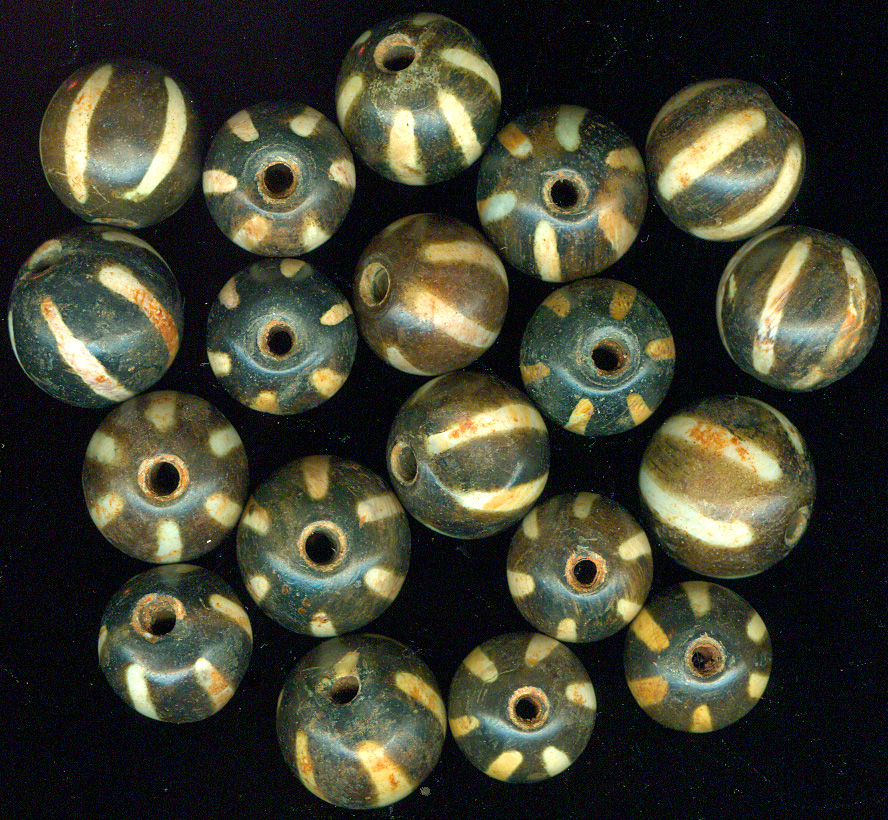
The square and stunted small sized bead of black color decorated with white stripes was a different patterns
from most of the originality beads of Pyu. Although the Pyu beads were seen with differ sizes and color
pattern, from red and black stripes made of igneous rocks to a three colored stripe beads with a length over
six inches and some having from 2,4,6,8,10,12 to 20 stripes, I have never seen such a square bead of that
decoration. The weight that was so light could not be made of either igneous, carnelian or agent rocks.
Except pure plastic manufactured these days. “Something is wrong with this. I think it is not a product of
Pyu.” Hopefully it could be demonstrated by burning the beads. “Are you going to sell those beads?” asked a
friend. “No. You can take them if you want. How can I tell you lies? Am I going to tell likes for such beads
between you and me? You are the son of teacher Lay, aren’t you?” said the villager who got the beads. Just
knew that my father once worked as a headmaster at the village and stayed at the person’s home. Had no
word to say but to buy the beads. Experiment was ready when I got outside the village. The gas lighter was
on and the black striped bead went into the yellow and blue flames. Nothing happened. Later after some
days, got to know from a brother that such beads were drifted from the sand streams and scattered around
in different villages including Lat Wae Kan where one bead was brought. Those villagers would keep those
beads in a small pot and bury them just to keep it safe. Research on the Pyu beads are not extensively made
and the way the beads are being scattered these days can make someone difficult to classify among other
qualities similarly done in a mass production. Also with a new pattern seen every time a bead was found and
after the study about the nature, the limited Pyu beads were always magical.
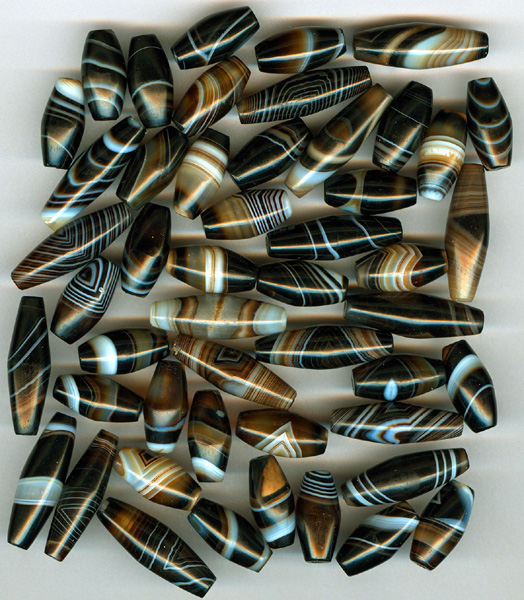
It can be said that the beads the Pyu people wore were similar to each other but have slight differences for
patterns and designs. Also it can be that after so many years, the ancient beads were scattered in a number
of locations. The culture of wearing beads is also a mystery. Giving an example, a red bead will be named
“Military Bead” and can be thought that the more the stripes decorated on the beads, the higher the rank is.
While the number of stripes decorated on the beads are mostly with an even number, it seemed that the Pyu
people favor only the even ones. However, beads that have an odd number of white stripes were also seen at
one point. Among the Pyu beads, the gold bead design is the most beautiful one and think that it would be
difficult for others to make a copy. Also when the Pyu people were traced back by the beads that they used, it
was found that the beads were found almost everywhere in the country. Some of the places they could be
found were in Thayaykittayar, Beithanoe, Han Lin, Mine Maw, Meiktila, Pyaw Bwae, Yamaethin, Pyinmanar,
Tatkone. Some of the most quality ones can be seen in the plain between Taung Twin gyi and Nat Mauk
and also in Minbu. Its fame does not come easy but just because of some extraordinary values. It was
referred that the white color of paint decorated on the beads include human milk but further research was
not made on the beads. It should be an interesting research to know about the making of the Pyu beads and
thus remained a puzzle. However, a personal experiment was made to see if the color of the beads were
durable. The white color of the beads did not fade away when put into Nitric acid. So it was no doubt that not
only Myanmar but foreigners also do prefer the Pyu beads. Looking at the culture of the Pyu people, their
standard of living can be referred as fashionable in a colloquial way. During the 9th Centaury, there was a
reference that Pyu music band went to China and offered the King with 12 songs. The music group was
led by the prince Thu Nanda in February 13, 802. The first song the diplomats performed was named
“Buddha’s trademark.” In the reference, the clothing they wore were described as “rose essence with the
scent of sunshine.” The color was worn on the top to match with the dark blue color at the bottom.
The clothing was called “Kai Man” that was made of pure cotton. It can be thought that the beads worn by
the diplomats reflect their religion, fashion accessories and could include other facts. The types of beads that
Pyu people wore include, patterns like tiger pictured beads, pictures of elephant and pig while there are
patterns like cylinder shaped beads of red, black or green colors. The decoration of the beads depends on the
creativity and the art and therefore, it is considered magical. As a limited edition, the beads will not always
be available for everyone and therefore, depends on the luck and of the beholder. So does the saying by the
Tibetans goes about these beads. It says, “as the beads come from heaven, it is a privilege to wear on the
neck. If the beads could not be maintained but broken, lost, sold out or to be exchanged, better swap it with
a bull.” The meaning goes that if one could not maintain such a beautiful and graceful product, it is better to
live with a bull. Foreigners do value the beads of Pyu more than Myanmar people. Except Myanmar, it can be
said that all neighbors including Thailand value and like the beads. It is also not so strange to conclude that
people are ignorant enough not to value such product at time when the country is poor, dark and hovered by
mosquitoes. It is still a long way to have a bureau to purchase such attire. Except Myanmar, the foreign
community do purchase the Pyu beads. It should not be too hard if said the beads are almost gone nowadays
as other countries have bought them. It is simple. The natural resources of a country is purchased, followed
by human resource. Among the list of the antique cultural products being purchased, the Pyu beads made at
the top list. So a question comes whether these antiques were copied for mass production? A person from
Taiwan once made a mass production of these beads and even sold the catalog that includes the production
steps of the beads. The person’s beads were made of glass. For these reasons, some even misunderstood the
fake beads with the real one after purchase. Those mass produced fake beads of Pyu can be seen as flawless
and with a same size. It is quite easy to differentiate them. Just put it in the palm and one can feel the heat if
the product is made of class compare to that of rock. For the original beads, when looked by a magnifying
glass, there are tiny little holes on the surface. The tiny hole that the string goes through is also not so
smooth like the fake ones done in a mass production. These frauds cannot be seen with the naked eye but
only if one really has the interest to explore nature. Some years ago, a brother brought beads without a hole
for the string to go through. I asked to send me to the village where these beads were found. There I was at
the village where the beads were being searched and found in the peanut fields. The villagers found a
profitable job after their main business of farming. Searching beads in the farmlands. One used the beads he
found as a pallet for the bow to catch birds. Daw Mya Khin from the southern part of the village had
one of the beads she found to replace her lost button of her dress. When the villagers were asked to bring
some beads, some approached. “They just came for knowledge and to see the beads. Not to buy them,”
said the owner of the house where we were putting up. “Harr,” said some villagers. They seemed to be
disappointed and when some started to head back their way, we decidedto buy some to save our trip. I also
really need to take a photo of the beads. “Where is the person who wants to buy the beads,” said a villager
who came into the house. “I have only one bead,” he said, pulling out a white bead from his pocked. A
pure white one. With my hands shaking, I tried to put the focus on the bead and got a picture of the
villager holding it. “I just knew it now. If I happen to see another bead next time, it will be a new design.”
“The beads are a miracle,” I said it to myself.
Source: Yangon Airways Inflight Magazine Swe Sone
Author: Myo Swe Than






